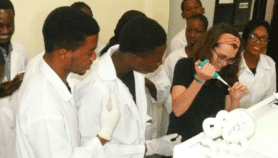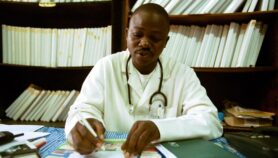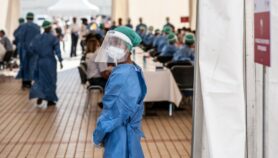Send to a friend
The details you provide on this page will not be used to send unsolicited email, and will not be sold to a 3rd party. See privacy policy.
Scientists, politicians, academics and others from across Africa comment below on the findings of the Commission for Africa, set up by UK prime minister Tony Blair, which were released on 11 March.
Additional comments, particularly concerning the commission’s recommendations relating to science and development, can be submitted to [email protected].
A summary of these recommendations can be read here. 
Further comments will be added to this page as they are received.
LAST UPDATED 22 March 2005

















































Dulce Eleonora de Oliveira
Visiting scientist, Institute of Plant Biotechnology for Developing Countries, Ghent University, Ghent, Belgium
"Making greater use of skilled expatriates to train African nationals as part of exchange processes is of major importance.
It is fundamental to enable highly trained expatriates to participate in technology transfer. It will be good for their countries of origin and for themselves, as it opens the possibility to return to their home country while they can still pursue their personal aspirations.
The creation of African research centres, using science to address the needs of the region will attract scientists from all over the world interested in contributing to the continent’s development.
An effective way to achieve technology transfer is by setting up thematic networks to mobilise national, regional and international expertise committed to resolving each particular development issue.
This would help nations identify science and technology goals and priorities, and orient their capacity for achieving these goals. International agencies should support and finance the networks so that they can last long enough to be effective."
Comments made to SciDev.Net contributor Wagdy Sawahel

















































Gibril S. Eljrushi
Dean of the Faculty of Engineering, 7 October University, Misurata, Libya
"Before commenting on the report, let me give my view of how a developed country works. Macroscopically, we see the following main three sectors working in harmony:
(1) The sector producing ideas and innovations (which includes excellent universities and research centres);
(2) The sector converting ideas into products or services and marketing them (which includes high tech companies with experienced personnel);
(3) The government sector, which excites and promotes the innovative sector, and organises and encourages the productive sector.
Now, what do we have in the first category? In my country — Libya — very little.
What do we have in the second one? In my country, again, almost nothing.
What about the role of the third one? I think you have the answer.
The Commission for Africa’s report describes the usual problems that almost everybody knows, then gives recommendations to be funded by the hard-working societies in developed countries.
I suggest that, in Africa, the usual relationship between the scientific community and policymakers must change. African governments should have clear national policies and strategies for science and technology.
They should provide special working conditions for their best scientific and technological talent, including better incomes and improved support for research, especially for young scientists and engineers.
Finally, African nations should hold a summit conference on science and technology to plan for the future of their societies."
Comments made to SciDev.Net contributor Wagdy Sawahel.

















































Simon John
South Africa
"An African Institute of Technology! An excellent idea!
Let us start with regional institutes.
Southern African Development Community (SADC)
Eastern African …
Western African …
Northern African …
Central African …
Starting with at least five centres and later expanding to each country could be feasible.
Good luck!"
Comments made directly to SciDev.Net.

















































Dele Olawole
Electronics engineer and founder of www.AfricaService.com, Stavanger, Norway
"This appears to be a case of the culprit chasing the innocent. It is a good start that Tony Blair thought of this but the main issue now is to call on Western nations to ensure that all the money stolen from Africa is repatriated. They know the thieves, so they cannot pretend that they do not know where all the money is. And after that, allow Africans to decide what development is and how they intend to get there."
Comments made directly to SciDev.Net.

















































Peter Anyang Nyong’o
Planning and National Development Minister, Kenya
"The Commission for Africa will set a new paradigm for science-based trade, development assistance, investment and development in Africa.
The report is part of efforts to realise the Millennium Development Goals through the use of science and technology, including access to better services in health, education, agriculture, and industrial development.
The commission has generated very important dialogue on Africa’s development, which will culminate in a significant policy shift in the international arena with respect to investments and development assistance.
The historical lesson of the Marshall Plan — which encouraged US investment in Europe after the Second World War —shows that a calamitous historical heritage can be turned into a positive tool for development and reconstruction when major global players become magnanimous."
Comments made to SciDev.Net contributor Zablon Odhiambo

















































Julia Higgins
Foreign secretary and vice-president of the Royal Society, United Kingdom
"We very much welcome the commission’s report and its recognition of the fundamental importance of science, technology and innovation to meeting the many challenges that Africa faces. We were initially concerned that the importance of science, technology and innovation might have been overlooked by the commission, but the report demonstrates a proper recognition of their role.
We hope that G8 leaders will commit themselves at the Gleneagles Summit in July to acting upon the commission’s report. In particular, we would like to see a commitment that all new initiatives aimed at African countries, from increases in overall aid to specific development projects, should include explicit measures to build their capacity in science, technology and innovation."
Comments made in a statement to SciDev.Net

















































Hillary Jagona
Librarian, Nairobi, Kenya
"Due to the lack of information and research centres in most African countries, including Kenya, key solutions to science development are difficult to adopt. This has even made it difficult for researchers to operate because they do not find information easily. Information communication in Africa should be based on development issues."
Comments made directly to SciDev.Net

















































Ayo Onatola
Librarian, St. Christopher’s College of Medicine, Luton, United Kingdom
"The need for more attention to be given to science and technology in Africa is nothing new.
Permit me to restrict my comment to Nigeria, the ‘giant of Africa’, where I hail from. Since Nigeria’s independence in 1960, its various governments have given little or no attention to education.
No wonder most of the industrial strike action by the members of the Academic Staff Union of Universities centred on the ridiculously poor allocation to education (a part of which is science and technology).
It is unfortunate that there are so many people with science specialities when these fields have been relegated by successive administrations at all levels of government.
A further effect is that the next generation is discouraged from going into science.
Nigerians are made to experience ‘lack’ in the midst of plentiful natural resources such as crude oil and minerals, which need scientific and technological interventions to be exploited.
Instead of working towards technological advancement, what the government does is to give prominence to business subjects and pay lip service to ‘science education’.
Not wanting to sound unpatriotic or pessimistic, it would be better to delay any allocation and release of funds to the Nigerian government — with the 2007 election coming up, the funds could disappear.
As a pilot step preparatory to the grant of any financial aid, the Nigerian government should be tasked to initiate some positive measures, such as providing grants in support of local research, bursary awards to science students in tertiary education, free tuition to science students in secondary schools and compulsory free education at elementary schools throughout the country."
Comments made directly to SciDev.Net

















































John Mugabe
Executive director, New Partnership for Africa’s Development (NEPAD) science and technology secretariat
"The Commission for Africa’s report provides a good basis for engaging the G8 on specific science and technology proposals. It is now the responsibility of African countries to build local / national political support for the commission’s recommendations. The African Ministerial Council for Science and Technology established by NEPAD and the regional economic communities such as the Southern African Development Community and the Economic Community Of West African States should ensure that African heads of state and governments consider the commission’s science- and technology-related recommendations. High-level African political leadership is now required to ensure that the G8’s focus on Africa does not ignore science and technology."
Comments made directly to SciDev.Net

















































Shem Wandiga
Director, Centre for Science and Technology Innovations, Nairobi, Kenya
"The commission’s recommendations for the continent are very opportune. Last week, at a UNESCO workshop focusing capacity building in science, participants recommended that there should be at least one centre of excellence in a university in each African country.
The African continent must take full advantage of the existing international goodwill for the development of emerging science, technology and innovations to spur socioeconomic growth.
African countries must now strive to harness the gains in science and technology to improve livelihoods and to wrestle the perennial challenges to development."
Comments made to SciDev.Net contributors Kimani Chege and Zablon Odhiambo.

















































Mohammed Khalil Abdel-khalik
Medical professor, Cairo University, and chair of the genetic engineering committee, National Council for Education, Scientific Research and Technology, Egypt.
"The commission’s report highlights the problem of Africa’s brain drain — about 20,000 highly qualified Africans scientists leave the continent every year. Africa could one day benefit from this ‘exile of scientific skills’ by offering scientists abroad the necessary conditions to encourage them to come back and do research locally.
Reducing the outflow of scientists could be achieved by linking African research centres with the private sector to increase funds available to pay scientists and buy scientific equipment.
Funds provided according to the commission’s recommendations, should be used to create a central registry of highly talented African scientists abroad. All African countries should be informed of the availability of this pool of talent and be able to request the services of individual(s) listed.
All expenses including travel, boarding and lodging would preferably be borne by the host country; though in special circumstances the registry could perhaps help cover the costs."
Comments made to SciDev.Net contributor Wagdy Sawahel.

















































Ken Lipenga
Minister of information and tourism, and official spokesperson for the government of Malawi
"Efforts made by the international community to help Africa to develop are always welcome and worth commending. With the international community taking this action, African governments should aim to curb corruption, which rampant on the continent. There has been a deliberate effort to promote science and technology in Malawi. The president recently announced plans to establish a science and technology university in the administrative capital, Lilongwe. The are high chances for African nations to develop with science and development in the driving seat."
Comments made to SciDev.Net contributor Charles Mkoka.

















































Pius Ng’wandu
Tanzanian minister for science, technology and higher education
"We have received the commission’s recommendations positively. They are good and timely. Some people have criticised what has been proposed, but I say the commission has done a very commendable job.
We are now living in the world of science and technology. But Africa cannot make it alone — we need the support from the North. If what is proposed can be put into practice, Africa can start growing.
The recommended US$500 million each year for the next 10 years to strengthen universities would lay foundations for capacity building.
We cannot hope to build the economy or science and technology without training our people, but universities in Tanzania can only admit less than ten per cent of qualified candidates because of limited resources. The situation is similar in other countries.
By supporting our universities, rich countries will be supporting our national economies. University is the place where experts in various fields can be trained. With trained experts, you can easily find the solution to the problems facing Africa.
The proposed funding is a prerequisite for Africa to conduct research on malaria, HIV/AIDS and other areas related to science and technology, such as properly managing waters resources in Lake Victoria and the Nile Basin."
Comments made to SciDev.Net contributor Deodatus Balile.

















































Bates Namuyamba
Zambian minister of science and technology
"I am very happy to note that the report has taken into consideration the important role that science and technology plays in the economic development of any country.
I must thank the people who came up with this report. As a science minister, I feel satisfied with the report’s content on science and technology though what is on paper remains to be translated into a reality.
The proposed US$500 million a year over a period of ten years for African universities sounds good but sourcing this money is another thing, and is what we are looking forward to seeing.
The amount seems little, but what matters is that the money could lessen the financial difficulties that African universities have faced for years, and which have led to some universities closing."
Comments made to SciDev.Net contributor Michael Malakata.

















































Ruth Oniang’o
Shadow minister for education, Kenya
"I wish to commend the commission for a wonderful report and for their commitment to Africa, which we now can critique. Compliments to prime minister Tony Blair for his leadership in this regard.
I am a passionate worrier over the way Africa is developing and continue to ask our creator: What crime did Africa commit?
As I head towards being 60 years old, I can see that I will not be around to see the Africa I dream of — a food secure and proud Africa. However, I have never lost hope and I feel it is imperative for each one of us to appeal to our friends and networks, and show them why they should continue to assist Africa.
That assistance must, however, start with ourselves, must be led by ourselves and must operate within an environment of good governance.
Having just spent two weeks in New York during the winter at the Commission on the Status of Women Conference, I feel sorry for New Yorkers, yet see what America has achieved despite the most terrible and harsh weather.
Yet, with Africa’s favourable weather, at least Nairobi, we are unable to provide responsible, selfless leadership for our people, to enable them develop mother continent. I am a trainer, a professor, and I have seen over the years the standards of education in my country go down.
Instead of spending resources to develop our national tertiary institutions including universities, our government allows Kenyans to spend hard-earned money sending children overseas. There is a serious brain drain as newly trained professionals who leave Kenya fail to come back because they can earn more overseas, and the situation back home continues to deteriorate.
Why should Tony Blair love Africa more than we Africans do ourselves? What happened to patriotism? Our friends will always be there to assist so long as we use what is given to us from their taxpayers in a responsible and transparent manner.
African governments must review their higher education and training policies, make some hard decisions and direct resources to the rehabilitation of our institutions of higher learning.
Our universities have professors trained in top universities abroad, so surely where have we gone wrong? I feel embarrassed by all this begging when we are unable to provide effective, selfless leadership.
African governments should be the first ones to put money in the kitty."
Comments made directly to SciDev.Net.

















































Cordelia Salter-Nour
Founder of fair trade website www.eShopAfrica.com, Accra, Ghana
"Obviously the Commission for Africa is talking about the whole continent, but effective implementation has to be thought out on a country-by-country level.
Within Africa there is a big Anglo-Franco (and other language) divide, which affects everything including types of and attitudes towards university education.
There were strong academic links during colonial times and for some countries (such as Sudan) there is a great wealth of academic material on climate, environment and culture. However, not all of it is physically located in Africa as the departing colonial powers took much of it home with them.
Surely the fastest way to strengthen African university education would be for Western universities to immediately open fully accredited branches in the African countries their nations used to rule.
Such a scheme could be implemented relatively easily with the funding channelled through the universities. Western universities would get more funding (something they are always seeking) and would benefit by having their areas of study broadened to include subjects relevant to Africa.
Academic exchange at the professorial level would enable Western academics to better understand African problems and African academics to become accredited in newly defined African fields of study, which they could teach in Western universities.
English universities are opening branches in China to help stem the Chinese brain drain … why not in Africa?"
Comments made directly to SciDev.Net.

















































George Kingoriah
Executive secretary, National Council of Science and Technology, Kenya
"The Commission for Africa’s timely report has clear support from Kenya’s scientific community, especially as it recommends strengthening capacity in science and technology.
Many of its suggestions should have been implemented long time ago by African governments, which have avoided funding science and technology, leaving this instead to foreign donors.
Most Africans know that South Africa has managed to be a leader in science through government funding. The country have built innovation hubs and this should be the way all African nations should go.
While I support the building of centres of excellence, they should not be seen as the only source of innovation. Existing universities and other learning centres remain a source of innovative science and new technologies."
Comments made to SciDev.Net contributors Kimani Chege and Zablon Odhiambo.

















































Mohamed Hassan
Executive director, The Academy of Sciences for the Developing World (TWAS), Trieste, Italy
"It is very good news that both higher education and centres of excellence have been identified as priorities by the Commission for Africa, and given attention that they deserve.
I am particularly pleased that the commission has spoken about the need for regional centres of excellence. There is certainly a case for strong national research centres in Africa. But the greater need is to establish these on a regional basis. And that means that donors also must adopt a regional approach to supporting science and technology, and not just work with individual countries, some of which may not be able to engage in bilateral science and technology programmes.
In some of the talk about the New Partnership for Africa’s Development (NEPAD), for example, it seems that some governments and donors are looking on this body largely as an umbrella organisation, but still prefer to work with national governments. This is very worrying; what is needed is the regional approach that NEPAD is trying to promote.
The strengthening of universities should also take place on a regional basis. Universities should act as regional universities to attract students from other countries.
Some of the existing universities used to be strong regional institutions. Makerere University in Uganda and the University of Khartoum in Sudan, for example, used to attract students from across their region. But that is not longer the case. The challenge now is to rebuild such institutions to the level of influence that they held in the 1960s and 1970s.
I also like the way that the report emphasises the need to strengthen the efforts of NEPAD in science, using the model of networks linking together centres of excellence.
However, the scientific community should be more involved in these efforts than it is at present. Building up centres of excellence needs to be done in collaboration with bodies such as the African Academy of Sciences, and the Network of African Science Academies. Both of these are important entities that need to be used and given support."
Comments made directly to SciDev.Net.

















































Milner Makuni
President, Computer Society of Zambia
"The Computer Society of Zambia is happy that the Commission for Africa will be sourcing money for African universities. But this is not to say that our government should now sit down and relax. Rather, they will have to work tirelessly to supplement the commission’s efforts by strengthening science education at every level through funding of learning institutions."
Comments made to SciDev.Net contributor Michael Malakata.

















































Njabulo Ndebele
Vice-chancellor, University of Cape Town, South Africa and president, Association of African Universities
"The Commission for Africa’s call for the developed world to support the Africa’s development in a significant manner is welcome. It follows the emergence in the past decade of positive trends in the continent’s development agenda.
There is increasing peace and stability; democratic governance is spreading and stabilising; strong regional economic zones have emerged; the African Union is providing firmer political leadership; and the New Partnerships for Africa’s Development (NEPAD) is overseeing a process of economic revival based on the notion of stable and viable states.
In all this, African governments are showing a new appreciation for the role of higher education in promoting development through increased human capacity. This emergent state of affairs means that Africa has greater leverage to determine what the development agenda should be and what kind of aid is required to promote it.
One hopes that the aid effort galvanised through the Commission for Africa will be less prescriptive than past interventions.
The revival of the African University is a crucial aspect of state revival. The Association of African Universities has plans to enhance significantly the social impact of higher education across the continent. The Commission for Africa support in this regard will be most timely."
Comments made directly to SciDev.Net

















































Khalifa Abdel-Maksoud Zaied
Professor of genetics, Faculty of Agriculture, Mansoura University, Egypt
"Numerous initiatives for science and technology development in Africa have been announced before but very little has been implemented. Thus, as far as the recent report of the commission for Africa is concerned, we have nothing to say apart from wait and see whether the commission’s recommendations are endorsed at the G8 meeting in July 2005 and if so what is the real impact on the ground.
Africa’s science and technology sectors need sweeping reform, not just ‘cosmetic’ changes that decision-makers are carrying out most of the time.
African governments need to understand that science and technology are means of existence and progress not a luxury, and this understanding must be translated into investment.
The commission’s main recommendations should be transferred into practical programmes for strengthening of scientific and technological skills in Africa, financing science and technology, promoting joint research programmes, and promoting cooperation among universities, research institutes and productive sectors.
Among the priorities are training young researchers, promoting of intellectual property rights and strengthening ethics in research."
Comments made to SciDev.Net contributor Wagdy Sawahel.

















































Tarek Saif
Environmental biotechnologist, National Institute of Oceanography and Fisheries, El-faiuom, Egypt
"Egypt could share its expertise in science and technology with other African nations, the fields of drug and vaccine research, and electricity.
Part of the US$3 billion being proposed for developing centres of excellence should support Egyptian initiatives for combating diseases and developing science and technology in Africa.
These plans include creating an African Council for Scientific Research to promote technology-based economic development, establishing a centre for research on widespread infectious diseases including AIDS, malaria and tuberculosis, and setting up an African council for ministers of power and energy."
Comments made to SciDev.Net contributor Wagdy Sawahel.

















































Mohamed Hamoud
Head of genetics division, Botany Department, Tanta University, Egypt
"The universities Africa needs for science and technology to develop are sick through a lack of capacity and resources.
Some of the US$5 billion dollars recommended by the commission, should be used to establish joint African and foreign universities to promote technology transfer, and so that African researchers could benefit from foreign expertise.
Egypt is a good example in that direction. It already hosts French, German and US universities with a lot of African scientists.
At the end of 2004, the Egyptian president Hosni Mubarak issued draft resolutions for establishing additional joint universities with Canada, Romania and the United Kingdom. These universities will provide training in scientific and technological disciplines, which the Egyptian job market needs.
Discussion is also underway to establish a Japanese-Egyptian university for science and technology that would promote technology transfer from Japan to the Arab world."
Comments made to SciDev.Net contributor Wagdy Sawahel.

















































Ezra Chilembwe
Director of the Agricultural Research and Extension Trust, Malawi
"The Commission of Africa’s call to create centres of excellence in science and technology is a welcome one.
The Agriculture Research and Extension Trust is a centre of excellence in agricultural science and technology that is making a significant contribution to the scientific and industrial development of not only Malawi but also Kenya, Mozambique, Tanzania, Uganda, South Africa and Zambia.
There is need to build the region’s research capacity. We wholeheartedly support efforts to build and strengthen the capacities of agricultural science and technology institut













